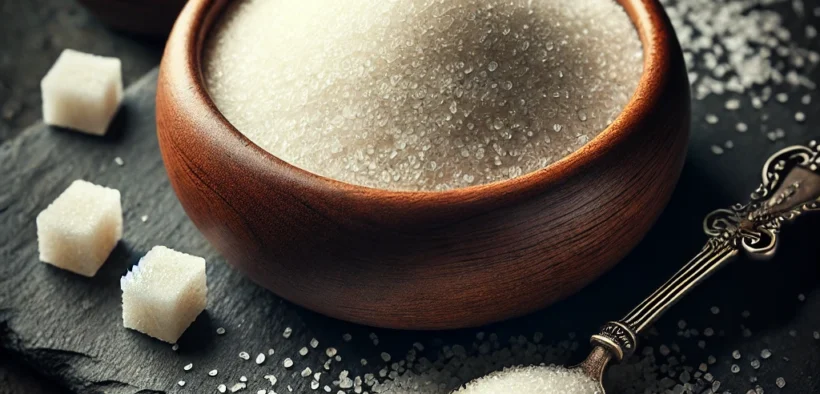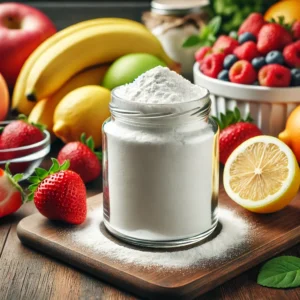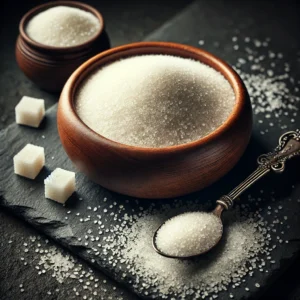Erythritol: A Comprehensive Guide to the Pros and Cons of This Popular Sweetener
Share

🧐 What Is Erythritol?
Erythritol is a popular sugar alternative classified as a sugar alcohol. It’s derived from natural sources like corn and fruits. Erythritol offers a fraction of the calories of regular sugar, making it ideal for weight management and low-carb diets.
🌱 Naturally derived from sources like corn or fruits, this sweetener offers 60–70% of sugar’s sweetness while containing only a fraction of the calories. It’s particularly popular among individuals focused on weight management, controlling glucose levels, or adhering to ketogenic diets.
🔬 How is it made? This substitute undergoes a fermentation process with glucose, producing a crystalline substance resembling table sugar. Widely approved in over 60 countries, it appears in many low-calorie and sugar-free foods, such as candies, baked goods, and beverages.
💡 Why Choose This Sweetener?
1️⃣ Low-Calorie Option
✨ At only 0.24 calories per gram, it’s a major calorie-saver compared to sugar’s 4 calories per gram. This makes it an excellent tool for reducing caloric intake while enjoying sweet flavors. 🍩➡️🌱
2️⃣ Blood Sugar-Friendly
This alternative has a glycemic index of zero, making it ideal for:
- 💙 Diabetics
- 🥑 Keto enthusiasts
- Those following low-carb diets
3️⃣ Gentle on Teeth 🦷
Unlike regular sugar, this sweetener doesn’t promote cavities or tooth decay. Its dental-friendly properties make it a popular ingredient in toothpastes and chewing gums. 😁
4️⃣ Easier Digestion
Compared to other sugar alcohols, 90% of this sweetener is absorbed in the small intestine, reducing fermentation in the gut. This lowers the likelihood of bloating, gas, and diarrhea. 🧘♂️
⚠️ Potential Drawbacks
1️⃣ Digestive Sensitivity
🚨 Consuming excessive amounts—typically over 50g daily—may result in mild bloating or laxative effects. However, this happens less frequently than with other substitutes.
2️⃣ Cooling Sensation
This sweetener creates a slight cooling effect when dissolved, which some individuals may find undesirable, particularly in recipes like baked goods.
🍴 How to Use This Sweetener
- ☕ Sweetening Drinks: Ideal for coffee, tea, or smoothies as a low-calorie sugar alternative.
- 🥧 In Recipes: Works well in baking and cooking. For enhanced flavor and reduced cooling, pair it with other natural sweeteners like stevia or monk fruit.
- 🍬 Making Homemade Treats: Perfect for sugar-free candies, jams, and frostings.
- 🛒 In Packaged Foods: Found in protein bars, sodas, and low-calorie chocolates.
✅ Is It Safe?
Regulatory bodies such as the FDA and EFSA have recognized this sweetener as safe. It is well-tolerated even in higher doses.
💡 Moderation remains important. Always consult a healthcare provider if you have specific dietary concerns.
⚖️ Comparison with Other Sweeteners
- Stevia: Offers a sweeter flavor but may have a lingering aftertaste. Combining it with this sweetener balances the taste. 🌿
- Xylitol: While also natural, it has more calories and is more likely to cause digestive discomfort.
- Artificial Options: Unlike sucralose or aspartame, this alternative is derived from natural sources, appealing to health-conscious consumers.
💭 Final Thoughts
This low-calorie option is an effective, versatile sweetener for various dietary needs. Whether you’re managing weight, controlling blood sugar, or exploring healthier choices, it’s a reliable alternative when used in moderation.
FAQs: Erythritol
| Question | Answer |
|---|---|
| What is erythritol, and how is it made? | Erythritol is a natural sugar alcohol made by fermenting glucose or cornstarch using yeast. It’s found naturally in fruits like melons and pears. |
| Is erythritol good for weight loss? | Yes, erythritol has 95% fewer calories than sugar, making it a great choice for those looking to cut calories and lose weight. |
| Does erythritol raise blood sugar? | No, erythritol has a glycemic index of zero and does not spike blood sugar or insulin levels. |
| Can erythritol cause digestive issues? | In large amounts (over 50g), erythritol may cause bloating or mild diarrhea, but it’s less likely than other sugar alcohols. |
| Can I use erythritol in baking? | Yes, erythritol is heat-stable and can be used in baking. However, it may not brown or caramelize like sugar. |
| What are the advantages of erythritol over sugar? | Erythritol is low-calorie, does not affect blood sugar, and is tooth-friendly, unlike sugar, which causes cavities and spikes glucose. |
| Does erythritol taste like sugar? | Erythritol is about 60–70% as sweet as sugar and has a similar taste, though it may have a slight cooling effect. |
- Braised Halibut with Carrots and Coriander: A Weeknight Delight

- Understanding Supraspinatus Tendinopathy with Partial Thickness Tear: Symptoms, Treatment, and Recovery

- Stevia: Why You Should Always Read Labels on Keto-Friendly Products Carefully

- Erythritol: A Comprehensive Guide to the Pros and Cons of This Popular Sweetener

- Tasty- Yummy Tex-Mex Chicken and Rice

- Brown Rice and Beans with Corn and Cherry Tomato Salsa

- Pan-Seared Salmon with Lentils and Chard

- Lemony Chicken with Spinach and Potatoes

- Turkey Meatballs with Lemony Rice

- Baked Shrimp and Orzo with Feta and Tomatoes

- 7 Myths About Yogurt and Probiotics

- 8 Best Tips for Buying Healthier Yogurt 🥄







